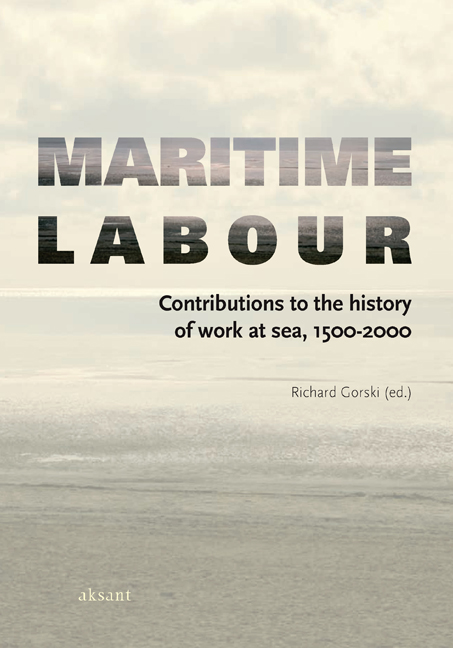Book contents
- Frontmatter
- Contents
- Introduction
- Six Cross-sections of the Dutch Maritime Labour Market: A Preliminary Reconstruction and its Implications (1610-1850)
- On Maritime Labour and Maritime Labour Markets in Germany, 1700-1900
- Swedish Naval Personnel in the Merchant Marine and in Foreign Naval Service in the Eighteenth Century
- Quantifying British Seafarers, 1789-1828
- ‘But for the Loves of the Fishes’: Maritime Labour and Ecological Culture in Nineteenth-century Newfoundland
- The Shipping Federation and the Free Labour Movement: A Comparative Study of Waterfront and Maritime Industrial Relations, c.1889-1891
- Health and Safety Aboard British Merchant Ships: The Case of First Aid Instruction, 1881-1908
- British Merchant Marine Engineer Licensing, 1865-1925
- Transatlantic Fishers: New England and British Trawlermen, 1960-1972
- Masters and chiefs: Enabling globalization, 1975-1995
- About the Contributors
On Maritime Labour and Maritime Labour Markets in Germany, 1700-1900
Published online by Cambridge University Press: 26 January 2021
- Frontmatter
- Contents
- Introduction
- Six Cross-sections of the Dutch Maritime Labour Market: A Preliminary Reconstruction and its Implications (1610-1850)
- On Maritime Labour and Maritime Labour Markets in Germany, 1700-1900
- Swedish Naval Personnel in the Merchant Marine and in Foreign Naval Service in the Eighteenth Century
- Quantifying British Seafarers, 1789-1828
- ‘But for the Loves of the Fishes’: Maritime Labour and Ecological Culture in Nineteenth-century Newfoundland
- The Shipping Federation and the Free Labour Movement: A Comparative Study of Waterfront and Maritime Industrial Relations, c.1889-1891
- Health and Safety Aboard British Merchant Ships: The Case of First Aid Instruction, 1881-1908
- British Merchant Marine Engineer Licensing, 1865-1925
- Transatlantic Fishers: New England and British Trawlermen, 1960-1972
- Masters and chiefs: Enabling globalization, 1975-1995
- About the Contributors
Summary
Introduction: The limits of pre-modern German seafaring
From the seventeenth to the nineteenth century the development of seafaring and hence of maritime labour markets in the German seafaring states was closely linked with the development of international law concerning the right to navigate the seas. This law – like any international law – was the outcome of power contests. If, from the sixteenth century onwards, German seafaring states were too weak to participate in this brokerage of power then they were nevertheless affected by the results. This article will focus on one of the reactions to changes in the Law of the Sea: the transition from custom to regulation in maritime labour and maritime labour markets.
In the later middle ages, German towns had formed the Hanse (or Hanseatic League) in order to further the interests of local merchants. They bought privileges in foreign countries and they organized the military potential to defend these interests. Already in the thirteenth and fourteenth centuries the Hanse merchants had made use of convoys as well as of sea-blockades to safeguard their position. By these means they had been able to not only fend off ‘pirates’ but also any other attempt to encroach on their supremacy over the intermediate trade of Northern Europe. During the fourteenth and the fifteenth centuries the Hanse was able to uphold its dominance in the North and Baltic Seas, but this position became endangered as soon as the interests of their potential competitors came to be defended by ships carrying artillery and by the nuclei of modern navies. While the military power of the Hanseatic League was effective enough until the beginning of the sixteenth century, the towns were not in a position to meet the fiscal or organizational requirements of maritime warfare which became necessary when rising territorial powers put some of their means into the modernization of their military potential. Having lost its supremacy at sea, the League could no longer uphold its position ashore. Former privileges of the Hanse towns in their outposts were abolished or severely curtailed. This loss of maritime military power and the ensuing loss of many trading privileges was the beginning of the end of the League.
- Type
- Chapter
- Information
- Maritime LabourContributions to the History of Work at Sea, 1500–2000, pp. 43 - 60Publisher: Amsterdam University PressPrint publication year: 2008



